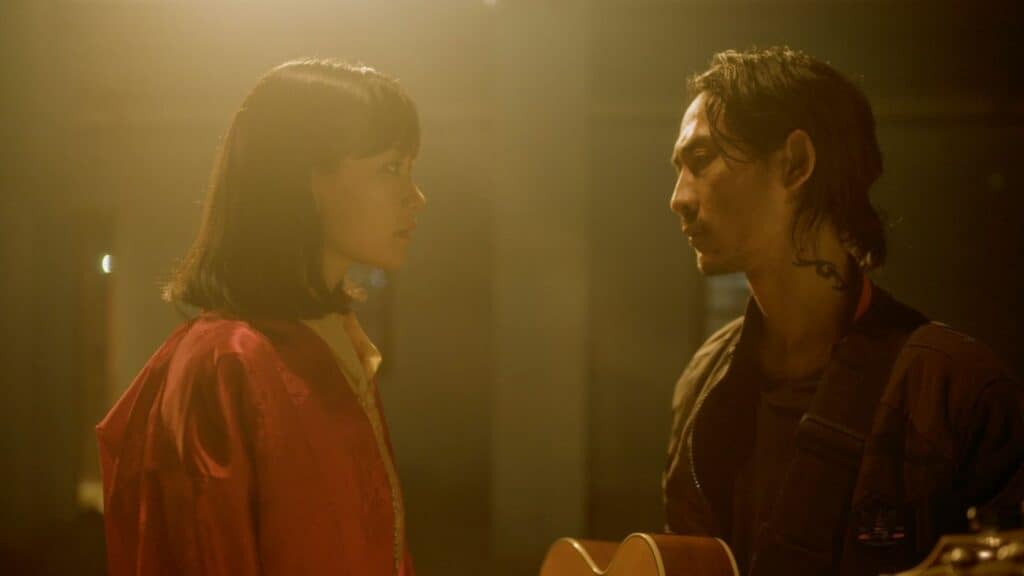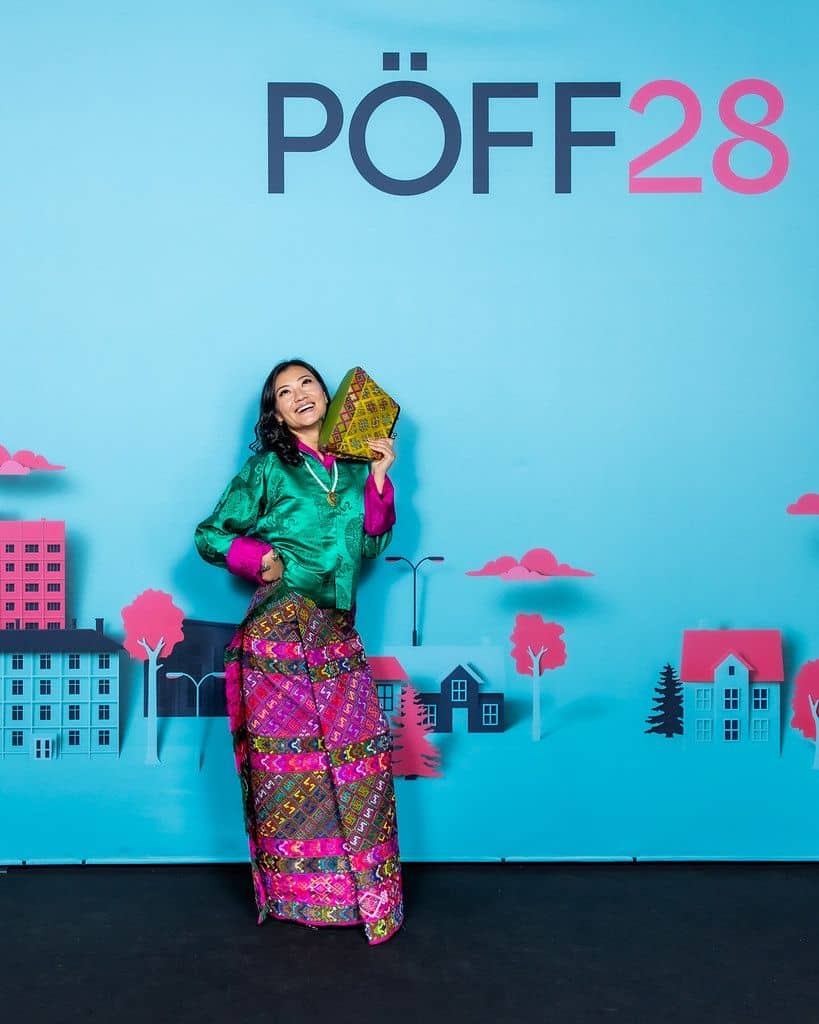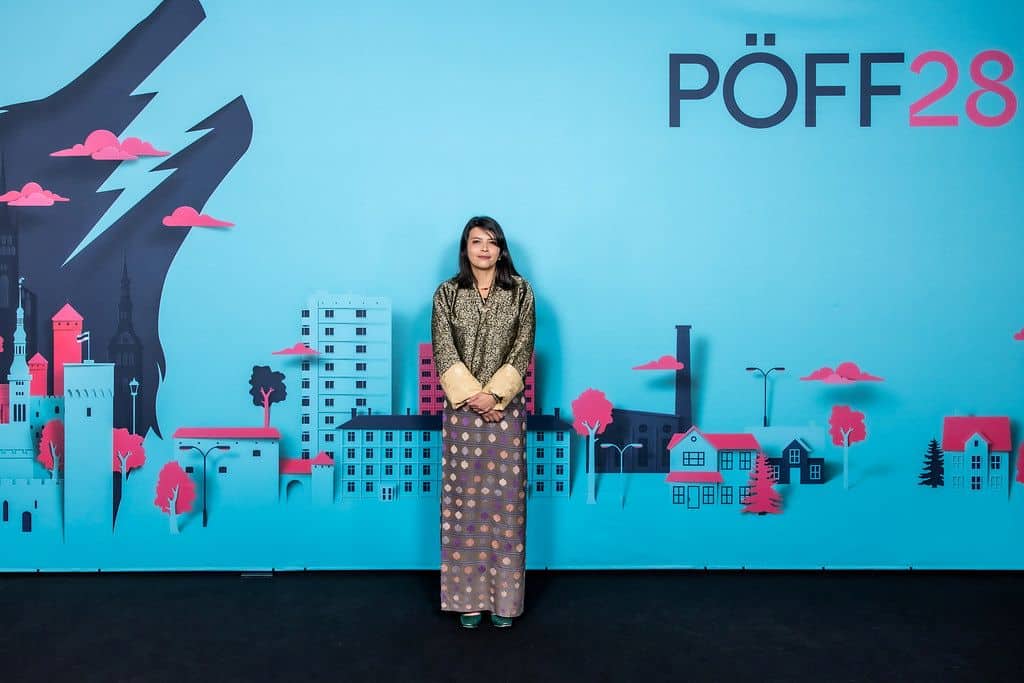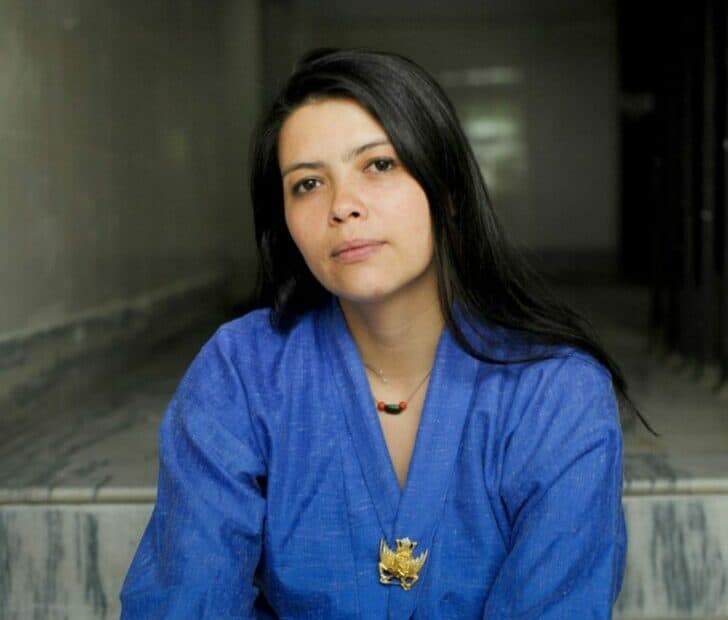2017, I watched Dechen Roder’s debut feature, Honeygiver Among the Dogs, at the Berlinale. I was intrigued by this mystical work and was pleased to learn that her new film, I, the Song (reviewed here), would have its world premiere at the Black Nights Film Festival. After the premiere, I had the opportunity to interview the director. We started talking about the time gap since her previous film.
The Disapproving Swede: What have you been doing since 2017?
Dechen Roder: I have been trying to raise finances for this film. It was a difficult film to finance. Writing the script took one or two years. Of course, I do many other things on the side, like commissioned documentaries.
TDS: What was the genesis of the film? I understand that some things happened to friends of yours, but there is also a news story about a song being stolen.
Like you said, it is about those two things. In a broader sense, bringing these two elements together says something about the modern age and Bhutan’s reaching the digital age. With smartphones and social media, it all happened fast, of course, worldwide, but in Bhutan, it happened even faster.
TDS: Maybe you started later, so then it accelerated faster?
DR: Our modern culture has jumped fast in Bhutan because we had the oral tradition of storytelling, which was usually the only one, including songs, and from there, we jumped right into the visual. We didn’t have a literature culture. Many people were not literate until the Sixties. We’re moving too fast, and we can’t develop a moral consciousness about everything, which is not only true for Bhutan; I think it’s all over the world, but I think in Bhutan, it is stronger. This film is more a reflection, like an attempt to pause and say, what are we doing? How can we go forward?
TDS: What is it like being a woman in Bhutan?
DR: Considering the region, Bhutan is ahead as far as equality, discrimination, and disadvantages against women are concerned. It’s not there in the infrastructure or the formal rules. On the other hand, they have different views on the demands of how a woman or a man should behave. It’s much more about the collective consciousness of how women see themselves and how society sees women.
TDS: Bhutan obviously have a Buddhist tradition, but how strong is it in people’s minds now? Does it affect daily life?
DR: Buddhist tradition is powerful in peoples’ minds. Even if you’re not like a devout practitioner, you’re still a Buddhist by way of life and culture, but I don’t think that it is affecting gender politics that much. You have seen my previous film, and It’s about women who are quite strong, powerful, and free. We have these kinds of women in our cultural history. In some strange ways, I think we are sometimes going backwards as we take on more global ideas of female and male empowerment.
It sometimes goes the other way, actually putting women at a disadvantage in a strange way.

TDS: So, considering those Dzongkha songs. Is it true that they are becoming less popular because they are more challenging to sing than recent music?
DR: I think it’s complicated to sing because pop music is much freer and more colloquial. Some older songs are not recorded and were passed forward in the oral tradition.
TDS: Are the songs we hear in the film mostly the older kind?
DR: They are from all eras because I really wanted to show Bhutan how it is now. We have pop songs, we have elements of tradition all around us, and then we have Western influences.
TDS: When I saw that TV show, I thought, “Bhutan Got Talent”.
DR: Yeah, exactly, it is like that, so I wanted to show all of it. Tradition and new music exist simultaneously.
TDS: How would you describe the role of the music in the film? Is it part of the storytelling in a way?
DR: It is part of the storytelling in a way because I wanted to show how hard it is to pinpoint a song. For instance, there are cover versions of them. Is it the same song when it’s covered and once it’s remade? In this modern day and age, who we are, what we are is more fluid. Since the story has a doppelgänger motif, I wanted to mirror the theme of identity. The poetry of music is all around us, and that also goes for the title: I the Song. All our lives are actually songs that can never be contained.
TDS: Like in one of my favourite directors, Alain Resnais…
DR: Oh, I love him too.
TDS: In On connait la chanson, major parts of the film are sung, and it is a reflection of what songs mean in our lives.
DR: I must watch that one.

Dechen Roder about Doppelgängers
TDS: You mentioned mirroring, which goes back to the theme of the twin (or doppelgänger). It’s not the first film ever made with two women who look alike. How did you approach that, and how did you work with the actress Tandin Bidha?
DR: As you said, it’s been done in many movies, but I felt it mirrors this theme with songs and identity. The idea with those two women look exactly alike, but their lives are so different. I can not deny that it was loosely inspired by The Double Life of Véronique and also Suzhou River. Especially Véronique, since it has a mystical quality to it. It is never really explained why they look alike. I felt that was something that I wanted to incorporate into this film, like more metaphysical, more transcendent. The two women look alike, but is their spirit the same?
That goes for the songs, too. Is the essence the same? That’s why I also wanted to play with how the characters see them. Only one character can sort of tell the difference—only he can—and not even from their dresses or their physical appearance but from something deeper.
TDS: Like he sees into her soul or something, maybe that’s the wrong word.
DR: No, it’s something similar; only he senses the truth. That’s why I also wanted to play with the marks on the body. The ritual with the items that appear is about the same thing. Does that make the essence, or can we get it just from these physical surface-level identifiers, or is there something more profound?
Big in Bhutan
TDS: How did you explain the part(s) to the actress? I think she is really good.
DR: Yeah, she does a really good job. It’s pretty amazing that she could do this film because she’s actually a big commercial actress in Bhutan, and our industry is much more like Bollywood. For her, it was pretty tough in the beginning. She is used to working in films that don’t even give her a character. She never really had a chance to explore characters. When we started, we talked about the rhythm of the dialogue, the body language, and even simple things like how to place her hands. Once those things were set up, she also grew her character.
TDS: Or characters.
DR: Yes, she wasn’t merely following how the characters were written but added her own things. I saw that even more clearly during the premiere. How she shaped the Nima and Meto characters with her looks and movements, the way she turned her head, for instance. She really got that.
TDS: How did she react to watching herself on the screen?
DR: She was really happy. She hadn’t seen the entire film until the premiere. I was slightly nervous about how she would react, but she was very happy with it.

TDS: The cinematography is quite striking. Sometimes, it reminded me of your first film, and sometimes, not. Do you think the two films relate to each other? If not, you could talk about how you approached the cinematography.
DR: I think they do relate to each other in some ways. With this film, we developed two very different narratives to tell the worlds of two very different characters. I think Nima’s world is a little more related to my previous film, with the detective’s world…
TDS: Exactly.
…with the formula I use. with someone doing the investigation, coming into their world with a very practical, sort of clinical view, and how it kind of changes as they transform in this journey. Then, of course, we had Meto’s world, which is different, and then we had the ritual segments and also sort of this merging of the characters towards the end. Here the colour was important. So I, the Song is more mapped up with more transformation. Honeygiver Among the Dogs was more consistent.
TDS: More following the narrative?
DR: Yes.
TDS: The cinematography also works really well with the songs and the soundtrack. Considering the topic of the film, that’s vital. Could you talk about the soundtrack?
Dr: I had the same musician as in my previous film. He is a very particular musician. He improvises a lot, and his unique way of experiencing a song was also an element that inspired how we made the music, but it also affected the story a little bit. It goes back to the theme of essence. What is the core of a song, and what is its true nature? Maybe you must be there and experience the music live, not on a recording.
TDS: I wasn’t merely thinking about the soundtrack but also the sound design in general.
We had an excellent sound designer from France, Mikaël Barre. He could feel the narratives and add much texture to the design. Minor elements that you don’t necessarily think of but work subconsciously. He is one of the key collaborators on the film. His contributions made it into a more transcendent film.
TDS: Do you still live in Bhutan? Sometimes, there’s a festival film from some African country, and the director lives in Paris and only visits the home country to make the film.
DR: Yes, I live in Bhutan. I don’t think I could live anywhere else as a filmmaker. I see some directors from Asia or South America who make a small, successful film and then move to the West and start making films there. I couldn’t do that because I wouldn’t feel the story. For me, making films is not just a directorial craft; it’s almost more of an intuitive thing that I have to do.
